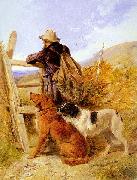|
|
|
|
|
Richard ansdell,R.A.
|
|
The_Gamekeeper
|
|
19th_century
|
|
|
|
|
|

|
|
Click to Enlarge
|
| Richard_ansdell,R.A.
|
The Gamekeeper
new22/Richard ansdell,R.A.-646443.jpg
|
|
|
|
|
|
| 19th century |
|
|
1815-1885
English painter. He was the son of an artisan and in 1835 entered the Liverpool Academy Schools, where he later became president (1845-6). One of his earliest and largest dated works is the Waterloo Coursing Meeting (1.4*2.4 m, 1840; Liverpool, Walker A.G.). This canvas demonstrates his considerable skill as a portrait painter and creates a detailed record of a major sporting event of the period which was attended by many members of the local aristocracy, some of whom, notably the 3rd Earl of Sefton, were his patrons. It was engraved and published in 1843, and other works were similarly popularized. Shooting Party in the Highlands (1840; Liverpool, Walker A.G.) was the first of 149 works exhibited at the Royal Academy. It shows huntsmen with their horses and dogs resting after a good day's sport, a theme that Ansdell often depicted. He also portrayed other rural scenes such as gamekeepers or shepherds with domestic and wild animals, often in historical settings. All are painted with precision and sensitivity and without sentimentality. Although based in London from 1847 until 1884, Ansdell owned houses in Lancashire and Scotland and found inspiration in northern landscape. He travelled to Spain with the painter John Phillip in 1856 and alone in 1857 and produced several works of Spanish inspiration, for example Feeding Goats in the Alhambra (Preston, Harris Mus. & A.G.). He also collaborated with William Powell Frith and Thomas Creswick in rural genre scenes. Ansdell was commercially successful and was elected ARA in 1861 and RA in 1870.
|
|
|
|
|
|
|